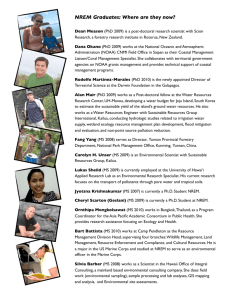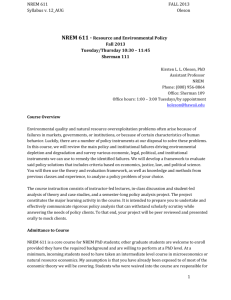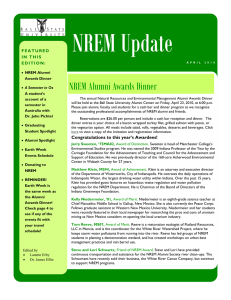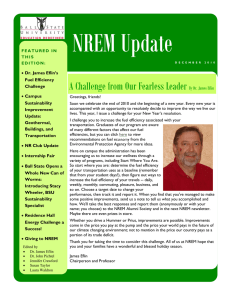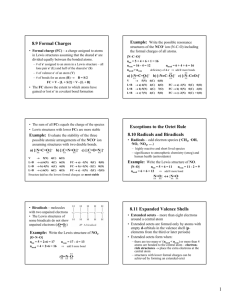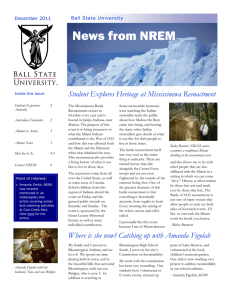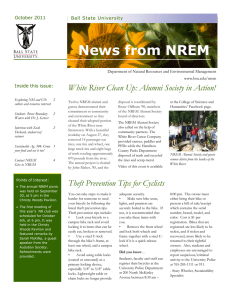News from NREM Spotlight: Dr. Charles Mortensen, Emeritus Ball State University
advertisement
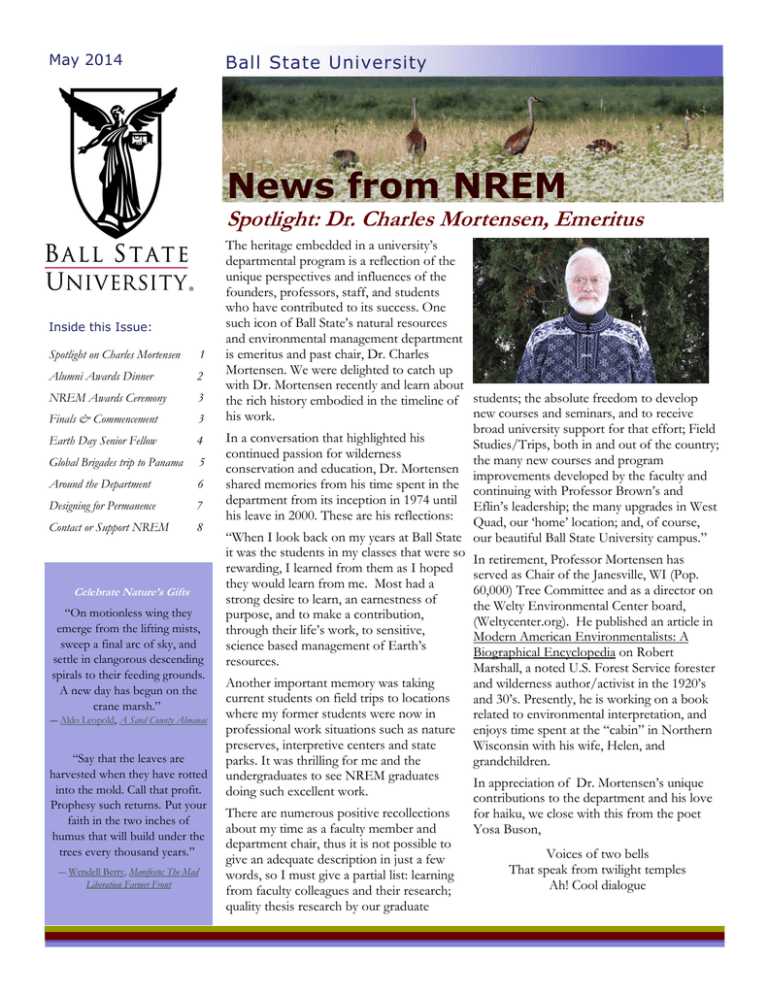
May 2014 Ball State University News from NREM Spotlight: Dr. Charles Mortensen, Emeritus Inside this Issue: Spotlight on Charles Mortensen 1 Alumni Awards Dinner 2 NREM Awards Ceremony 3 Finals & Commencement 3 Earth Day Senior Fellow 4 Global Brigades trip to Panama 5 Around the Department 6 Designing for Permanence 7 Contact or Support NREM 8 Celebrate Nature’s Gifts “On motionless wing they emerge from the lifting mists, sweep a final arc of sky, and settle in clangorous descending spirals to their feeding grounds. A new day has begun on the crane marsh.” ― Aldo Leopold, A Sand County Almanac “Say that the leaves are harvested when they have rotted into the mold. Call that profit. Prophesy such returns. Put your faith in the two inches of humus that will build under the trees every thousand years.” ― Wendell Berry, Manifesto: The Mad Liberation Farmer Front The heritage embedded in a university‟s departmental program is a reflection of the unique perspectives and influences of the founders, professors, staff, and students who have contributed to its success. One such icon of Ball State‟s natural resources and environmental management department is emeritus and past chair, Dr. Charles Mortensen. We were delighted to catch up with Dr. Mortensen recently and learn about the rich history embodied in the timeline of students; the absolute freedom to develop new courses and seminars, and to receive his work. broad university support for that effort; Field In a conversation that highlighted his Studies/Trips, both in and out of the country; continued passion for wilderness the many new courses and program conservation and education, Dr. Mortensen improvements developed by the faculty and shared memories from his time spent in the continuing with Professor Brown‟s and department from its inception in 1974 until Eflin‟s leadership; the many upgrades in West his leave in 2000. These are his reflections: Quad, our „home‟ location; and, of course, “When I look back on my years at Ball State our beautiful Ball State University campus.” it was the students in my classes that were so In retirement, Professor Mortensen has rewarding, I learned from them as I hoped served as Chair of the Janesville, WI (Pop. they would learn from me. Most had a 60,000) Tree Committee and as a director on strong desire to learn, an earnestness of the Welty Environmental Center board, purpose, and to make a contribution, (Weltycenter.org). He published an article in through their life‟s work, to sensitive, Modern American Environmentalists: A science based management of Earth‟s Biographical Encyclopedia on Robert resources. Marshall, a noted U.S. Forest Service forester Another important memory was taking current students on field trips to locations where my former students were now in professional work situations such as nature preserves, interpretive centers and state parks. It was thrilling for me and the undergraduates to see NREM graduates doing such excellent work. There are numerous positive recollections about my time as a faculty member and department chair, thus it is not possible to give an adequate description in just a few words, so I must give a partial list: learning from faculty colleagues and their research; quality thesis research by our graduate and wilderness author/activist in the 1920‟s and 30‟s. Presently, he is working on a book related to environmental interpretation, and enjoys time spent at the “cabin” in Northern Wisconsin with his wife, Helen, and grandchildren. In appreciation of Dr. Mortensen‟s unique contributions to the department and his love for haiku, we close with this from the poet Yosa Buson, Voices of two bells That speak from twilight temples Ah! Cool dialogue Page 2 News from NREM Alumni Awards Dinner Alumni: go to bsu.edu/alumni, alumni groups, alumni societies, NREM to update your information and nominate alumni for awards Upon receiving the 2014 NREM Award of Merit, Megan expressed heart-felt gratitude for her mentor, Dr. Amy Gregg, for leading women toward careers in natural resources and environmental management. The NREM Alumni Society and the Ball State University Alumni Association hosted the 15th Alumni Awards Dinner on Friday, April 4, 2014. It was a jovial evening full of smiles, good conversation, and excellent food as NREM faculty, alumni, students and friends socialized, networked, and celebrated the accomplishments of the 2014 award recipients. John Scheiber, ’07, dubbed by NREM Alumni Society President James Davis, ’93 as the ―Poster boy for the NREM Internship and Career Fair,‖ also was presented with an Award of Merit. John, who has worked with the U.S. Army Corps of Engineers since 2007, is currently the natural resource project manager at Salamonie Reservoir. John has been actively involved with the department and is a consistent exhibitor at the annual NREM Internship and Career Fair, providing NREM students with career information and opportunities. Connie Tyner receives her award from James Davis. The awards began with leading lady, Connie Tyner, ’69BS’79, who received the Friend of NREM Award. Connie was recognized for more than forty years service as to the department and students as NREM’s first administrative coordinator. Connie had a way of meeting and knowing every student who went through the major. She jokingly reflected, ―I met you when you borrowed a key, and I especially remembered you when you didn’t return the key.‖ The memories Connie holds most dear are those of the students. Megan Nagle Bolyard, ’06, received the Award of Merit. She is the environmental manager and industrial waste compliance inspector for Indiana’s Department of Environmental Management (IDEM). She received the IDEM Exceptional Service Award in 2009 and is a three time recipient of IDEM’s Environmental Impact Award. The evening was capped with a presentation given by Award of Achievement recipient, Juan Andrés ―Andy‖ Soria, ’95. His presentation, ―Past, Present, Future,‖ walked the audience through a brief history of his professional experiences and success. Andy said that he gained inspiration from Dr. James Eflin’s Energy and Mineral Resources course nearly two decades ago, and expressed sincere appreciation for the overall support that NREM professors offered, especially for believing in his abilities. Andy shared the odyssey of his career, by way of his studies and work throughout North and South America, his experimentation with and discoveries of alternate fuels, and recently as a professor at University of Alaska. Andy spoke to academia’s need to encourage and challenge students to think outside the box in order to find new solutions for the imminent energy crisis. Karen Smith, MAE’79 and Dean Smith, MA’79 Dean is wearing a bolo tie in recognition of Dr. Thad Godish, NREM Professor emeritus. Dr. Soria praised Ball State University and the NREM department for leading the way for him when he first discovered his passion for the environment. Andy’s remarks resonated with faculty who recognized that he was speaking about pedagogical models being promoted by University administrators and embraced by younger faculty. Soria is currently Director of the Berglund Center at Pacific University. NREM Alumni Society Board members at the banquet included: front (from left): James Eflin John Bergman, Nat Baker, James Davis, Bruce Oldham; rear: Tim Johnson, Juan Carlos RamirezDorronsoro, Amanda Smith, Emily Kress, Denise Wright, Dean Smith Page 3 News from NREM 2014 NREM Awards & Recognitions Ceremony The department’s annual student awards and recognitions ceremony was held in the revered Music Lounge at the Student Center on April 21 (John Muir’s birthday, it was noted). Nearly 50 people attended, including NREM Alumni Society board members James Davis, ’93 and Kyle Johnson, ’01; everyone seemed to enjoy the lavish spread of appetizers and desserts. Awards were presented to: Alyssa Harman, Outstanding Senior; Jason Sprung & Michael Cooper, Outstanding Graduate Students; and Matt Pritchett, ’13 for Outstanding Service. Additionally, Dr. James Eflin proclaimed April 2014 ―Connie Tyner Month‖ as she was recognized for 40+ years of service to the department with the Outstanding Service Award. Samantha ―Sam‖ Harsh was announced as recently having been selected for an Honorable Mention in the national Udall Scholarship competition, one of only 30 students nationwide to receive this honor. Students who made the Dean’s Honors List for Fall 2013 were commemorated, then a new tradition was born when Karee Buffin, NREM administrative coordinator, was named the ―Employee of the Year‖ and ―Keeper of the Roll.‖ This latter referred to a dinner roll served to Dr. Eflin at a leadership retreat in August 2013, which has shown Chad Gemmen & Megan Buschur Jason Sprung & Michael Cooper no signs of spoilage. NREM will see how many years it lasts as it passes among employees. Waste management or curious artifact? Alyssa Hartman & Matt Pritchett Scholarships were announced for AY 2014-2015, including: the Clyde Hibbs Memorial Scholarship (Casey Middleton); Alex and Anna Nicoloff Scholarships (Megan Buschur & Chad Gemmen); Charles O. Mortensen Fellowship (Michael Cooper); Farmland Conservation Club Scholarships (Cathy iczak & Dylan Hayes); CITES Scholarship (Keegan Waggener); and the Cooper Science Award (Kyle Fender). Davis and Johnson presented the graduating seniors with NREM Alumni Society Commencement pins, and the graduates were encouraged to wear them proudly. Irene Liu receives her Commencement pin. Finals Week: “Crock Pot Wars” & Commencement NREM graduates gather one last time (?). The ―Crock Pot Wars‖ returned to NREM during Finals Week. On any given day, 25-40 people partook of food with a barnyard/wildlife theme: Monday was the ―bleat‖ with Stan Ross’ Venison Chili; Tuesday was ―oink-oink‖ with Dr. Eflin’s pulled pork ribs in lemon pepper gravy; Wednesday was ―moo‖ and ―cluck cluck‖ with Megan Sharp’s pulled beef and Dr. Ramirez’ chicken tacos; ―oinkoink‖ returned on Thursday with Dr. Gruver’s pulled pork barbecue; and Friday was ―baa, baa‖ with Eflin’s two pots, each with a pulled leg of lamb in a unique sauce. Following a first-ever NREM Commencement Breakfast on Saturday, it was time to get serious and march to Elgar’s ―Pomp and Circumstance‖ to be recognized for academic accomplishments during the College Commencement in Worthen Arena. NREM faculty and staff will miss these fine people, but we know they are wellprepared for life in the fast lane of environmental careers, and we hope they will stay in touch, be successful, and join the Alumni Association. Amy Gregg & Megan Sharp, ’07 Page 4 News from NREM Eric Dodd, Earth Day Senior Fellow Nearly 75 students and other interested individuals attended the first of Dodd’s presentations, titled ―Environmental Emergency Response – Priority, Pollution and Politics,‖ a very informative look at navigating the regulatory landscape and the importance of why NREM stresses so much the grasp of science but also of interfacing with government and the public. A group of nearly 25 students stayed on hand to listen to his second, less formal presentation, titled ―Alphabet Soup – 25 Years of Regulatory and Client Pressure.‖ Several NREM students eagerly gave Eric their resumes and many attended lunch or dinner with him to continue networking – exactly what the Executive in Residence program is about. Eric Dodd’s visit was capped off with a formal luncheon with Ball State University President Jo Ann M. Gora, Dodd’s wife, Jenny, and their four children, in addition to selected guests from around campus—19 people in all. Each year, the University brings one or more alumni to campus who serve as ―Executive in Residence‖ for a day or two. They are individuals who have been very successful in their careers, and they interact with students in informal as well as formal settings, spend time with faculty from their respective programs, and get a grand reintroduction to campus since most have not been back in several years. NREM was honored to have Eric Dodd, ’79 spend time with us on April 22-23. By invitation of the College of Sciences and Humanities, Dodd was formally named as ―Earth Day Senior Fellow.‖ His story is a remarkable one of success after much hard work immediately following graduation. His twenty-five year career has taken him from operating as a self-employed environmental remediation specialist with ―$300 and a pick-up truck‖ to an international business with annual revenue of $40 million. His experience ranges from removal of underground storage tanks and cleanup of chemical spills (his photos of train wrecks involving tanker trucks were chilling) through complete remediation of brownfields and heavy involvement in the aftermath of the BP Deepwater Horizon drilling rig in the Gulf of Mexico. If something’s gone wrong anywhere in the lower Midwest or Southeast part of the United States, Dodd and his various companies have been there and cleaned it up. Eric & Jenny Dodd enjoy dinner at The Barn Brasserie with Dr. Ramirez, Dr. Gruver, and others. We greatly appreciated the visit by Eric Dodd, and we look forward to welcoming him back again, soon. For more information about Eric Dodd and his businesses, contact Summit Environmental Services, LLC, 2125 Glenview Drive, Evansville, IN47720; phone (812) 421-1744; fax (812) 421-8106. Connect online at www.summitcontracting.net. Page 5 News from NREM Global Brigades Trip to Panama The GB mission for this trip was to empower members of two rural communities, Piriati Embra and Embra Puru, by encouraging the adoption of sustainable practices in agriculture, forestry, and waste management. The Brigade strategy was to work alongside the Piriati, Global Brigades (GB) is an international student-led organization learn about local biodiversity and educate community members about implementing health and sustainable ecological economic development development programs in partner communities around the world. At the and productivity. Commenting on their achievements, close of 2013, fifteen student volunteers from Ball State University‟s Derek Tepe stated, “Our group successfully planted nearly 350 chapter set off as an environmental cocobolo rosewood trees in two days. brigade to Panama‟s Emberá region. These dedicated students represented Twenty years from now, these trees will gift the wood to build houses and several disciplines across campus create the stunningly intricate artwork including anthropology, journalism, the community depends on selling to natural resources and environmental survive. The trees themselves will management, Spanish, and also provide shade for sensitive sustainability. We caught up with Alyssa Holfelt, Derek Tepe, and Olivia coffee plants in a mutually beneficial partnership, a cornerstone of Williamson and asked them to share permaculture principles.” their reflections about the trip. The Piriati, an indigenous group of approximately 780 people, live in the Emberá region of the Darien province an hour and a half east of Panama City. The Global Brigade experience in Panama was eye opening for the students. As an Environmental Brigade, many were bothered by the lack of infrastructure for appropriate waste management. Holfelt commented, “We found there are not many options for native Panamanians. The indigenous people either burn their trash or throw it into rivers. Trash collection companies do not exist in these communities, and the government is not concerned with implementing anything.” “All members of both communities were extremely nice,” said Alyssa Holfelt. “Everyone was happy to see us and was eager to talk to us,” she continued. Living at the compound, El Pamar, with nineteen people, 10 bunk beds (a pool table used for another), and two bathrooms was also a new experience for many of the Brigaders. After two days, they ran out of water. On this Holfelt stated, “Bathing with a bucket of rainwater is something I‟m sure many Brigaders hope to never have to do again.” The trip was transformational for Olivia Williamson. She reflected, “This experience will help me in the future to be appreciative of all the privileges I have here in the United States, and to never take what I have for granted. It taught me that I could live a minimalistic lifestyle, if needed.” For Derek Tepe, “The physical labor we partook in was but a fraction of the true “work” that we accomplished that week. Interacting with the Emberá in their community, learning their culture, sharing our culture, and building personal connections were very powerful.” Derek continued, “The Emberá opened their community and paved a way for us to understand the mutual needs and desires that exist within us all. We all built a deeper appreciation for the people with whom we share this planet.” See the BSU Global Brigade slideshow on YouTube. Search Ball State University Panama GB Trip 2013 or www.youtube.com/ watchv=p8JS5l8j8AM&feature=y outu.be . Page 6 News from NREM Around the Department American society is passionate about the discourse of food. An increasing interest in the role of food resources within society as a vehicle for understanding sustainability suggests the need for an undergraduate course on Food, Society and Sustainability. During a sabbatical leave in Fall 2014, Dr. James Eflin will explore this growing interest in food resources. He will travel throughout North America to learn from experts about various aspects of food systems and production. Along the way, Dr. Eflin will conduct research in the field of Food, Society, and Sustainability, and plans to use this to develop one or more new courses aimed at a wide range of undergraduate students. Dr. John Pichtel challenges students in their research addressing the decomposition of explosives in soil. Currently, two of his students are examining how soil microorganisms decompose nitroglycerin. They are especially interested in identifying the bacteria species responsible for this decomposition. Dr. Pichtel continues to teach courses involving management of hazardous materials, response to weapons of mass destruction, and awareness of terrorism. Dr. Pichtel has just completed the second edition of his textbook, Waste Management Practices: Municipal, Hazardous, Industrial (CRC Press). He is currently working on a new textbook addressing both international terrorism and hate crimes in the United States. That book is expected to be completed in 2016. Students in Dr. Amy Gregg‟s outdoor recreation class developed a multi-stage design proposal for playground and recess areas for Muncie‟s St. Mary school campus. This project was in partnership with BSU‟s Building Better Communities program. Students were tasked to propose alternative designs in theory that could be implemented over a multi-year time frame by the school. They were encouraged to “Think Outside the Box.” Students proposed resurfacing of playground areas for greater accessibility, new playground equipment, adding topographic features such as hills and tunnels and incorporating mobile games that could be used inside or outside. Dr. Gregg‟s research focuses on park and recreation departments across Indiana, the issues they face and the creative ways they overcome challenges. Gregg‟s research will contribute to the next Statewide Comprehensive Outdoor Recreation Plan. Dr. Josh Gruver‟s capstone course Integrated Resource Management is partnering with Delaware County‟s Soil and Water Conservation District (DCSWCD) to help in the development of a watershed management plan for the Mississinewa River watershed. Students have been working with GIS to create land-use and soil maps. They have been attending public meetings throughout the watershed to help educate residents and to listen to water quality and quantity concerns. Information gleaned from public meetings will help inform the plan. Educational and outreach material will be developed and mailed to landowners and residents and will be available on the DCSWCD website. Interimalerts! News department Dr. Jarka chair? Popovicova New faculty? will serve as Acting Chair during Fall semester, 2014, while Dr. Eflin is away on sabbatical. Dr. Jessi Ghezzi, a new graduate of University of Kentucky (Ph.D. 2014) has been hired to teach the full suite of soils courses during the upcoming year. Megan Sharp returns to teach NREM international courses and resource economics for the natural resources concentration. Karee Buffin survived her first academic year as administrative coordinator, and confirms that she will continue with NREM in the year ahead. Page 7 News from NREM Designing for Permanence Sustainable Agriculture class explores Permaculture and students launch a new initiative Permaculture, or “permanent culture,” is an ethical framework for designing with natural systems. The term was first coined by Bill Mollison, an Australian researcher, author, teacher and biologist considered to be the founder of permaculture. According to the Permaculture Research Institute of Australia, “The philosophy behind permaculture is one of working with, rather than against, nature; of protracted and thoughtful observation rather than protracted and thoughtless action; of looking at systems in all their functions, rather than asking only one yield of them; and allowing systems to demonstrate their own evolutions.” necessary, and everything is uniquely connected.” — Brian Kowalski “One particular topic I found interesting was the ability to use the environment to lower energy costs through heating and cooling. I would have never imagined how I could plant trees to direct wind patterns.” — Jacob Riddle Marking Contours “We must be curious, open to possible failures, and persistent in creating permanent connections to the natural world instead of conquests… I now value sustainable systems that I was unaware of.” — Micayla Jones Permaculture is practiced for land management use and as a model for education and social structures. There are private training courses offered all over the world connecting earthcitizens to these principles and inspiring participants to take action. This year marks the first permaculture course taught at Ball State University in the natural resources and environmental management department. Students in NREM‟s Sustainable Agriculture class, facilitated by instructors Megan Sharp, ‟07 and Amy Rhodes, created permaculture design proposals for the Juanita Hults Environmental Learning Center and farm located in Albany, Indiana. Implementation of a few of the student-proposed design elements began at the beginning of April. Projects included building bat houses, constructing a season extension hoop house, building a spiral herb garden, and inoculating logs with mushroom spores for cultivation and harvest. Peter Bane, author of The Permaculture Handbook (2013), speaks of establishing “household sovereignty” as a way to live the permaculture principles on a daily basis. Though it may be a few years before students of Sharp‟s sustainable agriculture class have houses of their own, many began realizing the value of co-habiting with all living beings in the scale of the Earth as their home. The first-time offered course generated a lot of productive feedback: “The first two weeks of this course provided the formula to see several new things. Primarily that, nature isn‟t against us, labor isn‟t always “I can‟t wait to go home for the summer because I plan on growing a huge garden… Instead of trying to keep animals from eating the crops I grow, I will plant extra crops… I don‟t care if animals eat my crops because the land I‟m using used to be their habitat.” — Ben Melbert “Implementing the project ideas at Hults farm was the most interesting part of the course… Seeing it applied to real life projects was the highlight of the course.” — Rachel Menale Herb Spiral Hoop House The excitement for putting permaculture into practice has not only been growing in the NREM, but is peaking across campus and into the local community. Champions of this growth are students and community members leading the way in the newly formed Permaculture Initiative. This group is comprised of Ball State students and faculty alongside Muncie residents and community organizations. The aim of the Initiative is to use permaculture practices as a way to build community resilience and also strengthen the bond between campus and the community. The group has formed a partnership with Minnetrista Cultural Center to establish an orchard this summer. Interested in learning more about permaculture? You can find many resources on-line, such as, http://permaculturenews.org/. You can stay updated on Permaculture Initiative meetings and activities on Facebook at www.facebook.com/ groups/permaculture.initiative/. Mushroom Logs Note: Amy Rhodes anticipates completing the MS in 2015. Megan Sharp earned her MS in Environmental Science from Taylor University in 2009. Ball State University Natural Resources and Environmental Management West Quad 110 Muncie, IN 47306 Phone: 765-285-5780 Fax: 765-285-2606 Visit us on the Web! http://www.bsu.edu/nrem Contact NREM and submit news for consideration in the newsletter! For more information about news and upcoming events, contact Karee Buffin, administrative coordinator, 765-285-5780, nrem@bsu.edu Please send news about promotions or new positions, recognitions, and changes in your contact information to Laura Waldron, bsualumni@bsu.edu, 765-285-1080. “Like” NREM Alumni Society on Facebook, and visit their Website. Click here to nominate an alumnus for an award. Thank You! NREM would like to thank those individuals who contributed to this issue of the newsletter. Your input is appreciated! Our gratitude goes to: James Eflin Cameron Fraser Amy Gregg Josh Gruver Alyssa Holfelt Faye Lichtsinn Charles Mortensen Amy Rhodes Students-NREM 304 Megan Sharp Derek Tepe Laura Waldron Olivia Williamson Support NREM and Achieve Active Alumni Status! The Ball State University Alumni Association has historically provided “active status” to alumni when they make monetary gifts through the BSU Foundation. These monetary gifts may be of any amount, to any BSU Foundation account, and take the place of a dues paying program that some other universities utilize. We ask that you consider becoming active-- it is a great way to say thanks for your own education and to ensure that Ball State continues to provide outstanding programs for its students and alumni. Your gift may be designated to any account in the BSU Foundation, including NREM. (Indiana residents can receive a 50% tax credit up to $200 when they file form CC-40 with their state taxes, reducing their out-of-pocket cost. Please contact either the BSUAA or Ball State University Foundation for more information). Not a Ball State graduate? We need your support as well. Please consider a gift to one or more of the following BSU Foundation accounts that support programs and scholarships related to NREM: Questions? 6201 General welfare of the NREM department 6203 Operation of the Hults Environmental Learning Center 6204 NREM Alumni Society activities and award programs 6216 Research programs with the NREM department To make a donation, please visit the NREM website and click on the link labeled “Make a Gift.” Or click this link: www.bsu.edu/giving 6217 Soil research projects with the NREM department 6218 Soil and water conservation education activities 6219 Renewable energy and industrial ecology research For more information about giving to NREM, contact Darleen Lugenbuhl at dmlugenbuhl@bsu.edu 6250 NREM scholarships 6253 Clyde Hibbs Scholarship 6254 Alex and Ana Nicoloff Scholarship To support the creation of a new scholarship, contact Dr. James Eflin, NREM Department Chair at 765-285-7055 or jeflin1@bsu.edu 6255 Charles Mortensen Fellowship
